














STYLE
Fashion-Forward Fall 6 Expert style tips for busy moms on the go
FAMILY MEDIA
Booklist: Manga Mania! 14 A local librarian’s prime picks for your family’s manga journey



EDUCATION
Outdoor Projects That Amp the Art in STEAM 24 Messy-fun activities to help stimulate artful summer learning
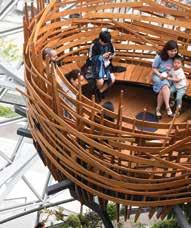

COMMUNITY
Neighborhood Spotlight: Arosa Café 26 Madison Valley hub engenders the spirit of Seattle’s coffee-loving culture

AGES + STAGES
No-Phone Zone 28 Can schools go completely phone-free (and should they)?
WELLNESS Mouthguards 101 30
Dental mouthguards are becoming more common — and recommended
One response to address the spiraling mental health crisis among teenagers is to hire more therapists. But this therapist has another proposal: Enhance teen mental health by expanding access to Mother Nature during school hours.

Have a binge-worthy series to recommend for summer?
My youngest child is heading off to university, all too soon. His departure naturally represents a gate-check in my “career” as a parent. How fitting, then, that the timing of this significant milestone of parenting coincides persackly with my outgoing note as ParentMap’s managing editor (welcome Allison Sutcliffe, our new managing editor!). For the past few years, this honored position has afforded me a monthly platform to opine, however randomly, about various aspects of being a proud [vulnerable, scared, perturbed, clueless, inspired …] parent in community with my fellow PNW mamas, papas, content allies, respected thought leaders and deeply adored colleagues. In shared service and collaboration, I believe that we have collectively helped each other be better caregivers, educators and healers of our children and community — that matters a whole helluva lot, and I thank you all.
So, with that said, please indulge me one final time in sharing a reflection on my personal parenting experience.
My heart *squeezes* with pride when I think about Tommy, my darling, sweet-natured, hilarious, easygoing, talented and punkin’-eyed lad. His besotted parents hope and expect that we have prepared him to hold his compass as a standup mentor, that he will be a force for good in this world.
At this watershed time, I find myself feeling surprisingly unmoored from my own compass as a mentor, partner, parent, friend, daughter and professional … it’s a convoluting time. As I contemplate the familial and professional identity transitions in front of me, I recall the wry and profound words of one of my earliest mom mentors and brilliant former editorial colleagues, Eleonore: Being a grown-up doesn’t just mean getting older, drinking scotch and paying taxes — it means learning to sit with discomfort. It means that when you are faced with something unpleasant, painful or disheartening, you don’t just bat it away like a gnat or a dog fart: You sit with the discomfort, you let it fill your body and saturate every last cell of your being — and you cope with it.
Amen, sister.
In more practical news, the fall BTS return is imminent, but none of us should ever forget that there are two seasons in Seattle (climate change acknowledged): winter and August. I hope you find plenty of inspiration in this month’s issue to eke out the maximum amount of family fun under the (relatively) benefic Seattle sun.
Thank you, again, dear readers. I leave you in excellent hands.
— Patty Lindley, director of content + audience engagementEDITORIAL
DIRECTOR OF CONTENT + AUDIENCE ENGAGEMENT
Patty Lindley
MANAGING EDITOR
Allison Sutcliffe
OUT + ABOUT EDITOR
Nancy Chaney
ASSOCIATE EDITOR
Kari Hanson
CALENDAR EDITOR
Julie Dodobara
COPY EDITOR
Sunny Parsons
CONTRIBUTORS
Gemma Alexander, Sarah Bradley, Nancy Chaney, JiaYing Grygiel, Laura Kastner, Ph.D., Kate Missine, Alayne Sulkin, Allison Sutcliffe, Jenna Vandenberg, Lindsay Zielinski
DIGITAL MARKETING
EMAIL MARKETING SPECIALIST
Devon Hammer
SOCIAL MEDIA SPECIALIST
Emily Feely
ADVERTISING SALES + PARTNERSHIPS
DIRECTOR OF COMMUNITY
PARTNERSHIPS + ADVERTISING SALES
Jessica Collet
SENIOR ADVERTISING AND PARTNERSHIPS MANAGER
Ida Wicklund
EVENTS + COMMUNITY
PARTNERSHIPS SPECIALIST
Brenna McCown
CLIENT SERVICES + DESIGN COORDINATOR
Angela Goodwin
ADVERTISING CLIENT SERVICES SPECIALIST
Mallory Dehbod
DIGITAL ADVERTISING + MARKETING SPECIALIST
Taryn Weiner
PRODUCTION COORDINATOR
Tamryn Nell
ART + PRODUCTION
SENIOR DESIGNER
Amy Chinn
ADMINISTRATION
BUSINESS MANAGER
Carolyn Brendel
OPERATIONS ASSISTANT
Erika Widjaja
PARENTMAP EDITORIAL ADVISORY BOARD
Benjamin Danielson, M.D. CLINICAL PROFESSOR, UW SCHOOL OF MEDICINE PRACTICING PHYSICIAN, UW MEDICINE
Joan Duffell RETIRED EXECUTIVE DIRECTOR, COMMITTEE FOR CHILDREN
John Gottman, Ph.D. THE GOTTMAN INSTITUTE PROFESSOR EMERITUS, UNIVERSITY OF WASHINGTON
Laura Kastner, Ph.D.
PSYCHIATRY + BEHAVIORAL SCIENCES, UNIVERSITY OF WASHINGTON
Bea Kelleigh VICE PRESIDENT, DOVETAILING, LLC
Yaffa Maritz, M.A. FOUNDER, LISTENING MOTHERS + COMMUNITY OF MINDFUL PARENTING
Daniel J. Siegel, M.D. EXECUTIVE DIRECTOR, MINDSIGHT INSTITUTE
“Bosch” (Amazon)
“Hijack” and “Severance” (Apple TV+), “Kaleidoscope” (Netflix)
“Top Chef” (Bravo)
“Queer Eye” (Netflix)
“Elementary” (Hulu)
CONTACT
INFORMATION
Advertising information 206-709-9026 or advertising@parentmap.com
Fax 206-709-9031
Calendar submissions
calendar@parentmap.com
Editorial submissions
editor@parentmap.com
Distribution
distribution@parentmap.com
Administration 206-709-9026, parentmap.com
Subscriptions subscriptions@parentmap.com
Subscription rate
1 year: $12






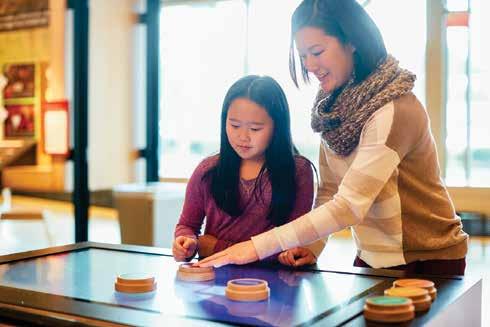
Models & Talent (tcmmodels.com) and a fashion consultant for The Bellevue Collection (bellevuecollection.com), to get the lowdown on the latest fall style trends and hottest multipurpose wardrobe staples she’s seeing for busy moms at The Bellevue Collection.
 By Kate Missine
By Kate Missine
Over the past few years, many of us have gotten pretty comfortable working from home in our PJs — maybe too comfortable! But for better or for worse, the remote-work landscape is shifting: This fall, more and more companies are recalling workers back into the office. Which means that in addition to confronting perennial worries about securing quality after-school care for their kids and navigating commutes, many working moms will find themselves with yet another workaday predicament: piecing together a presentable wardrobe of work clothes from a closet that has transformed into an unholy fusion of loungewear (47 pairs of leggings?!) and a dusty, ill-fitting suit from the pre-pandemic days.
Fear not, intrepid working mamas! We’ve got you covered — literally! We reached out to style expert Terri Morgan, owner of TCM
Believe it or not, the power suit is back in a big way. This fall, Morgan says, it’s all about the relaxed silhouette, which should make it easy to transition out of our sweats. Look for a widelegged trouser, and pair it with a boyfriend-cut blazer in basic black or navy to create a versatile look that can be worn either together or separately. We love pieces that play double-duty!
You may think you left this style behind in your college days, but Morgan tells us that preppy fashion is another trend that’s back for the season, and it’s a perfect one for assembling multifunctional outfits. The secret is in the layering: Start with a great white blouse, and then top it with anything from a button-front vest to a V-neck sweater, or even a hoodie (yes, Morgan assures us that this soccer-field basic can go to work — just make sure it’s a fitted cut). Add a boyfriend blazer (remember that versatile power suit?) or favorite jean jacket (a must for every wardrobe), and complete the look with a midi-length skirt, wide-legged jeans or trousers.
“Red is a big trend this season,” says Morgan, who suggests adding a pop of the color to your outfit to give it an instant update. A red sweater, shoe, handbag or scarf will bring in a bright accent without taking over. Anything from bold crimson to a subtle brick is fair game, says Morgan, noting, “Remember there are many shades of red, so make sure you are getting the shade that best suits your complexion.”
Concerned that the return to the office means trading in your cozy WFH slippers for torture devices? Not to worry: Painful high heels are no longer de rigueur when it comes to work-appropriate footwear. Instead, enter the sneaker! Morgan says that our playground kicks now play nicely with business casual attire. “They are the perfect shoe for the mom on the go,” she says. Just
Photo courtesy of The Bellevue CollectionConcerned that the return to the office means trading in your cozy WFH slippers for torture devices? Not to worry ...
up the ante a bit with a classy new pair — she loves the sleek Camper brand for its combo of comfort and style. Need a slightly more formal option? Opt for a classic pair of loafers, which look great with both pants and skirts.
Working moms everywhere know that our bags are bottomless Pandora’s boxes, porting everything from files and laptops to sippy cups, bags of Goldfish crackers, and a random rock or two. Well, luckily for us, tiny purses are out — and the Big Tote is in. “It’s the bag of the season and perfect for moms,” says Morgan, adding that oversized totes come in fabrication options to suit every taste, from puffy quilted fabrics to soft leathers.
Speaking of leather, it’s a hot fall choice for other wardrobe staples, too: Morgan recommends adding a motorcycle jacket, leather legging or pencil skirt to your closet as an investment piece that’s fun, durable and easy to wipe free of sticky kid handprints.
We all know getting our solid eight hours of beauty sleep is the best way to look rosy-fresh, but since that’s not happening anytime soon, we’re turning to the next best thing: makeup. Forget the full face of foundation and contouring (who has the time, anyway?); these days, maquillage is all about keeping it simple. Start with a nice undereye concealer — we all know we need it — and add a touch of blush/lip stain combo and a swipe of your favorite mascara.
When it comes to hair, dry shampoo is your friend to freshen up on the run; or toss your mane up into a banana clip. Morgan says these old favorites are “very much on trend again, and an instant hair fix!”
From the boardroom to the soccer field, moms can manage all of the transitions of their busy days in style, with The Bellevue Collection. ■
Kate Missine is a lifestyle writer, food lover and girly girl raising two boys in beautiful Sammamish.

Sponsored by

The Bellevue Collection features more than 200 shops, 50 restaurants and multiple entertainment options in The Dining District, as well as three luxury hotels and free parking, all in one place — it is the region’s largest shopping, dining, nightlife and entertainment destination. bellevuecollection.com

Teens tumble down their own unique rabbit holes into a mental health crisis, but one common factor parents blame for their descent is “screen addiction.” While we can quibble about the word “addiction,” when kids spend almost every waking hour scrolling through media instead of engaging in emotionally healthy academic, physical and social activities, it’s hard not to focus on phones as the problem.
But what many tweens and teens have is a life problem, not just a phone problem. They need what I call a REFRESH intervention.
The REFRESH basics:
R - Restful sleep
E - Essential nutrition
F - Fitness and exercise
R - Recreational fun
E - Enhanced relationships IRL
S - Stress-reduction strategies
H - Healing time in nature
Beyond therapy: Calling for a ‘Green Space Agenda’ One response to address the spiraling mental health crisis among teenagers is to hire more therapists (like me). Good idea! But focusing exclusively on what therapists can do to influence REFRESH goals in one hour a week is a limited view.
It’s more prudent to use a wide-angle lens to look at youth health problems. Kids spend an average of seven hours a day at school. Correspondingly, most report that school is the source of their greatest stress. And since stress is best treated at its roots, school is a great place to seed REFRESH solutions — and not just by addressing each student’s experience in the 1:1 setting of the counselor’s office.
What I propose: Schools need to employ a radical “Green Space Agenda” to enhance teen mental health — by expanding, as the name suggests, access to green spaces during school hours. This agenda would be a quadruple-hitter for punching those REFRESH buttons: Healing time spent in nature provides opportunities for stress
reduction, physical activity, fun and positive in-person socializing.
Decades of research have indisputably shown that nature exposure is associated with better academic performance, reduced stress levels, enhanced mental health and better social relationships. Enjoying recreation outside releases endorphins (the “feel good” neurotransmitters that provide relief from stress), encourages face-to-face interactions and enhances brain functionality.
Recess time at school has traditionally been associated with play and physical activity, and it’s a rare student who doesn’t find time outside in the unmatched stress-busting power of nature to be restorative. Other self-calming techniques kids can employ in the school setting include mindfulness practices, creating art and talking to friends.
The power of social relationships
Teens make friends, lose friends and suffer from the lack of friends at school. During the pandemic, many students — especially

marginalized kids who were already struggling with academic and social problems — were glad to have their school shut down. Escaping social pressure, anxiety and aversive experiences felt good initially, until the problems got worse.
Remote schooling disconnected students from essential in-person relationships with teachers, coaches and other adult mentors. Academics and friendships withered, and access to social media mushroomed.
Motivation for peer contact surges in middle school, and so does self-consciousness. Pubertal and brain changes elicit intensely negative and positive emotions during early adolescence. Since impulse-control capacity is not fully developed until the mid-20s, adolescent passions are often unleashed, especially in contexts with no adult supervision. Rambunctious social drives can bring trouble to playgrounds — of both offline and online varieties.
Teens’ desires to seek social connection and inclusion make them especially vulnerable to the lures of social media. Lurking, texting and posting on social media is a lot easier than making conversation in real life. As a result, conversation skills are rapidly becoming a lost art. Teens don’t even want to talk on phones anymore.
No wonder parents are promoting the Wait
Until 8th policy (waituntil8th.org). This campaign encourages caregivers to delay children’s access to social media until eighth grade. Without smartphones until eighth grade, kids are impelled to make friendships the old-fashioned way — in person.
With the recent publication of the U.S. Surgeon General’s Advisory on Social Media and Youth Mental Health, the downsides of excessive social media use are front-page news. While teenage sexual activity, drug use and drunk driving have decreased over the past decade, risks in the online world have proliferated.
In private and impulsive moments, teens download pornography, develop illicit relationships with strangers and interact in socially inappropriate ways that they would never conceive of doing offline. And even though social media can be used for positive connections, it can also be the source of social cruelty, disinformation, self-harm encouragement and spiraling negative emotions.
Social development is a key part of adolescence. Especially in the tween and early teen years, kids need guardrails and oversight, offline and online. As messy as the schoolyard can be, it is a conducive place for friends to be together and practice socializing — without phones.
Exercise is known to be one of the most important building blocks of our physical and mental health. But like essential nutrition and sleep, it requires motivation, opportunity and adult support. Advantaged families arrange after-school sports and weekend outings, but many families lack the neighborhood parks, economic resources and means to prioritize a focus on fitness for their teens.
As much as school sports are promoted for youth fitness, most kids do not participate, and those who do often quit by age 11. Competitive youth sports can be intimidating, exclusive — and expensive. Many kids report that by middle school, organized sports just aren’t fun anymore. And then there is a huge swath of tweens and teens who are uncomfortable in their bodies and feel humiliated by fitness metrics and social comparison. Combine all of these factors, and it is no wonder that 75 percent of teens are not getting the recommended 60 minutes per day of physical activity.
Expanding physical education programs and offering a wider range of options for school sports are both good ways to improve teen health, but playfields can also be used in more imaginative ways during the school day.
Maybe we can’t reach the goal of Finland’s
policy, which sends students outside almost hourly, but we can certainly try to give our tweens and teens more breaks during the day to move their bodies, clear their heads and breathe fresh air.
Connection with natural beauty is associated with increased positive emotions — awe, joy, wonder, happiness. Add some laughter with friends, physical activity and relief breaks from the classroom, and you have a pretty good recipe for generating positive emotions.
Exposure to natural light stimulates the production of vitamin D in our bodies, which plays a crucial role in mood regulation. It also helps normalize our body’s circadian rhythm, regulating sleep patterns and enhancing overall well-being.
Being outside in nature has even been found to help reduce repetitive negative thinking, an insidious aspect of depression. Since obsessive rumination can become entrenched, sometimes the best strategy for relief is a physical reset. Getting that anxious teen outside to do a grounding exercise such as “name five things” can often be more effective at disrupting the worry loop than dispensing words of reassurance.
The academic stakes for today’s students feel higher and more competitive than ever, with educational attainment representing a great determiner of who ends up in the “have” versus “have not” groups in our inequitable economic system. What parent doesn’t want to do everything they can to nudge their child’s odds to the high opportunity group? The problem is that those well-intentioned nudges result in pressure, stress and mental health problems, all of which keep students from succeeding and excelling.
Without understanding what supports the mental health of students, it’s easy to think that allocating more space and time for the Green Space Agenda is an unnecessary, lightweight and fluffy indulgence.
continued from page 9
FEATURE I confess: The reasons for not supporting the Green Space Agenda constitute a long list, including economic factors, lack of space, maintenance, safety concerns, accessibility and competing priorities.




And it is true that schools are challenged to address many competing agendas. Parents, educators and other stakeholders want more school time and resources dedicated to STEM curriculum, arts and humanities programming, AP and honors courses, organized sports, mental health programs and health education, to name just a few.

Ultimately, resting, rejuvenating and rebooting teen brains and bodies with the Green Space Agenda would help bolster all of those school agendas. In the end, the Green Space Agenda requires people to understand that enhancing mental health through many vectors will result in vastly improved cognitive, social and emotional functioning.
A holistic view on adolescent health helps us to appreciate that most families with tweens and teens need support for enriching the REFRESH basics. Excessive use of social media and declining mental health are linked with the crumbling of those building blocks of health.
Disadvantaged parents struggle to get their marginalized students connected with sports, after-school activities, and safe and positive contexts for socializing. Schools can be a place to offer these students the REFRESH enhancers that they deserve.

But even the most affluent and privileged among us suffer from stress overload and mental health problems — sometimes even more than the average, due to academic pressures and unrealistic expectations. Virtually all students need ways to calm their anxious brains in order to thrive.
As philosopher Martin Buber once said, “Play is the exultation of the possible.” Getting our stressed-out students outside for recreational time in Mother Nature will unleash untold creativity, imagination and possibilities for positive social relationships. ■

Laura Kastner, Ph.D., is the author of a number of parenting books, including the acclaimed “Getting to Calm” series. She is a clinical professor of psychiatry and behavioral sciences at the University of Washington.
























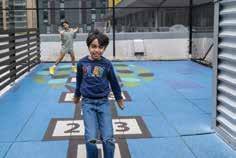





Preschoolers love big words—as any parent who has heard his four-year old obsess over dinosaur names can attest.






A Tyrannosaurus rex and a pterodactyl. An acute scalene and an obtuse isosceles triangle. A lanceolate and a deltate leaf.



From botany to zoology, from physical geography to geometry, 3- to 6-year-olds at LePort Montessori develop an astounding vocabulary and unmatched love for learning the fascinating world all around us. This is how Montessori makes young scientists.



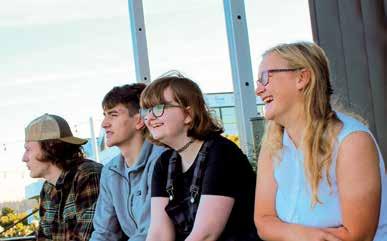





As a school librarian, I’m no stranger to perennial requests from my students for specific books spanning a wide range of topics. But over the past two years, there has been a noticeable uptick in requests from my students for … more manga!
According to New York Public Library children’s librarian Amanda Pagan, “Manga is an umbrella term for a wide variety of comic books and graphic novels originally produced and published in Japan.” Japanese manga is usually published in black and white, and is read from right to left. Many manga series are published over a long period of time and have a prolific publishing rate of new volumes.
There are five genres of manga targeted to specific audiences:
• Kodomomuke manga titles are literally “intended for children,” ages 10 and younger; themes include friendship and fun, with a splash of exploration into lessons of “right versus wrong.”
• Shōnen manga series target an audience of adolescent boys, ages 10–18; themes include coming-of-age topics, action and adventure themes.
• Shōjo manga titles target a primary audience of adolescent and young adult females; themes include coming-of-age topics, drama and romance.
• Seinen and josei manga are editorial categories of content directed at adult men and women (ages 18 and older); themes include the nuances of adult relationships, romance, sex, action and violence.
Parents need to realize that there can be quite graphic and weighty content in manga, especially in the seinen and josei varieties. Please remember to do a bit of
research on content if you have any concerns.
Here are a few titles to get you started on your family’s manga journey:

Manga titles for early readers
“Pokémon Journeys” Machito Gomi (four volumes) Ash teams up with new friend Goh on a “gotta catch ’em all” adventure.

“The Complete Chi’s Sweet Home” by Konami Kanata (four volumes) When a completely adorable kitten is separated from her mother, she is rescued by a young boy named Yohei. The only problem? Cats aren’t allowed in his family’s apartment!

“Splatoon” by Sankichi Hinodeya (16 volumes and counting)

Inkopolis is suffering through The Terf Wars, and the team that inks the most ground wins. Team Blue and Goggles may be expected to lose, but at least they have teamwork and creativity on their side!
“The Fox & Little Tanuki” by Tagawa Mi (five volumes, with more on the way)

Senzou the black fox was born with great magical powers, but abused and lost them.
To pay back the gods and earn his abilities once more, he must babysit a mischievous tanuki cub. Hilarity ensues.
“Yotsuba&!” by Kiyohiko Azuma (15 volumes)

Curious and quirky Yotsuba moves with her adoptive father to a new city. This sweet and simple story follows the adventures of Yotsuba and her friends, who live by the series motto “Today is always the most enjoyable day.”
“Sailor Moon Eternal Edition” by Naoko Takeuchi (12 volumes) Usagi struggles through school, never being quite good enough at sports, academics, or even friendship. When she meets a talking cat, her journey from crybaby to superhero begins.

“Haikyu!!” by Haruichi Furudate (45 volumes)

Shoyo Hinata has always wanted to be the best volleyball player ever, even though he isn’t very tall. When his rival, Tobio, becomes his teammate, he’ll have to figure out just how much revenge he’s willing to serve!
“Dr. STONE” by Riichiro Inagaki (26 volumes)

One fateful day, all of humanity is turned to stone. A few millennia later, high school student Taiju awakens to find himself lost among a world populated by statues. Luckily, his science-obsessed friend, Senku, is awake, too, and together they use the power of science to save civilization.
“Waiting for Spring” by Anashin (14 volumes)
Shy Mizuki is about to enter high school and wants to make friends. The four star players on the boys’ basketball team visit the café where Mizuki works, and soon she’s balancing friendship, jealous classmates … and maybe even … love?
“Silver Spoon” by Hiromu Arakawa (14 volumes)

Academically gifted and ready to explore the world beyond his family life in the city,

Yuugo Hachiken enrolls in an agricultural high school, thinking it will be easy. Unprepared for the hard labor of farm life, Yuugo begins to discover another side of himself — and a deeper connection to the land.
Manga reads for high schoolers
“Fullmetal Alchemist: Fullmetal Edition” by Hiromu Arakawa (18 volumes)

When an alchemical ritual goes awry, brothers Edward and Alphonse lose their limbs — and almost their lives. Follow the brothers on their journey to restore what they lost using the power of the Philosopher’s Stone.
“Takane & Hana” by Yuki Shiwasu (18 volumes)


In this sweet romantic comedy series, high school student Hana Nonomura agrees to take her older sister’s place in an arranged-marriage meeting with business fortune heir Takane Saibara. Opposites attract and sparks fly!

“My Status as an Assassin Obviously Exceeds the Hero’s” by Matsuri Akai (4 volumes, with more on the way) When Akira’s class is somehow summoned to a different world, he and his classmates
are given powers that suit their personal gifts and talents. Disappointed in his role at first, Akira learns to use his powers to uncover secrets and reveal the true intentions of the Demon King.
“orange: The Complete Collection” by Ichigo Takano (4 volumes) Naho begins 11th grade and receives a letter from herself, written 10 years in the future. When predictions in the letter start to come true, Naho realizes that a new transfer student named Kakeru will become part of her life in a way she never thought possible. Part sci-fi, part romance, totally lovely!

“My Hero Academia” by Kohei Horikoshi (37 volumes)

In a world where almost everyone is born with a superpower, Izuku Midoriya does not possess one. A chance meeting with the greatest hero of all time, All Might, changes Izuku’s future. There might just be a chance for Izuku to become a hero himself after all. ■
Lindsay Zielinski is a mom, wife and writer. She spends most of her time in libraries, where she is always looking for her next favorite picture book.

• Ages 2.5–5
• Morning or afternoon care in North Seattle
pineconesandplaytime.com
• Inspired by Montessori, Respectful Parenting, Big Little Feelings and play-based philosophies



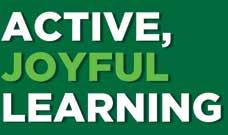






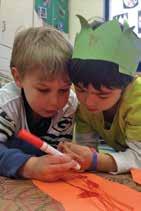





Seattle ranked No. 2 — just behind Orlando, Florida — in this summer’s top travel destinations in the United States, according to Allianz Partners.
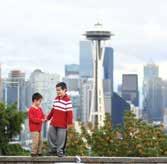
We are so lucky to live in this beautiful city that everyone wants to visit. Whether you’re going to be hosting out-of-town guests or planning a sweet staycation, save this cheat sheet to quintessential Seattle landmarks, from the iconic to those a bit more under the radar.
1. Space Needle
You can’t come to Seattle and not go to the Space Needle. The iconic structure, built for the 1962 World’s Fair, was renovated in 2018, and standing on the revolving glass floor is quite a trip. Below, don’t miss out on the thrilling Artists at Play playground (seattlecenter.com). The Peace Garden at the Seattle Center is home to the Anne Frank Tree, one of 11 saplings propagated from the original chestnut tree Anne Frank wrote about in her diary.
The best view of the city, however, isn’t from the top of the Space Needle. Head up Queen Anne Hill to Kerry Park, where you’ll get that postcard-perfect panorama encompassing the Space Needle and Mount Rainier.
You know about the fish throwers. The super gross Gum Wall. The first Starbucks.
Amazon Spheres

The Pike Place Secret Garden is truly a hidden gem. To find it, turn left just before you reach Maximilien Restaurant. From this rooftop garden, you get great views of downtown, and it’s the perfect quiet spot to enjoy a picnic of treats purchased at the market. All the herbs and vegetables grown here are donated to the Pike Market Food Bank.
3. The great outdoors
They don’t call it the Emerald City for nothing. The 534-acre Discovery Park is just 15 minutes from downtown, but it feels like a world in itself. In 2009, a wild cougar even found its way to the forested bluff. We love taking the Loop Trail down to the lighthouse to catch a sunset.
Runner-up is West Seattle’s Alki Beach, a sandy strand that feels more like Cali (complete with a palm tree) than the soggy Pacific Northwest.
4. ‘Sleepless in Seattle’
Tom Hanks was at Benaroya Hall in May for a Seattle Arts & Lectures event. If you missed the actor in person, you can always see him in the classic rom-com “Sleepless in Seattle,” which is marking its 30th anniversary this year. Today, swoony widower Sam Baldwin’s houseboat on the west side of Lake Union is a private residence. Navigate your kayak, motorboat or stand-up paddleboard on by to check it out. The Center for Wooden Boats (cwb.org) offers free monthly public sails that pass by the famous houseboat. Other screen-tastic Seattle landmarks include the “Grey’s Anatomy” intern house
(303 W. Comstock St. in Queen Anne) and the “Singles” apartment complex (1820 E. Thomas St. in Capitol Hill).
5. Mount Rainier
You have a narrow window in July and August to drive up to Paradise to see the delicate, subalpine meadows on Mount Rainier. Lots of other people have the same idea. The National Park Service is considering requiring reservations. For now, based on experience, we will tell you that you need to be at the gate before 10 a.m. or you’ll be out of luck for a parking spot. Mount Rainier is a 2.5-hour drive south of Seattle. Plan accordingly.
6. Cruise ship central
The cruise business is back and it’s big. The arrival of giant cruise ships marks the summer season in Seattle, but our favorite “cruise” is the 35-minute ferry ride to Bainbridge Island. Beautiful views of the water, a cute little walkable village on the other side and the best ice cream ever (Mora’s Iced Creamery). Plus, it’s cheap: Kids ages 18 and younger ride free, adults pay $9.45 for a round-trip ticket.
Bonus: Ferry riders sometimes spot orcas!
7. Bruce Lee
The martial arts legend called Seattle his home, and his favorite restaurant, Tai Tung Chinese Restaurant (taitungrestaurant.com) in the Chinatown–International District, has a booth dedicated to him. Bruce Lee and his son, Brandon Lee, are buried next to each other in Lake View Cemetery in Capitol Hill, about halfway up the hill in the cemetery.
The lowdown on where to be a tourist in your own town this summer
OUT + ABOUT


continued from page 17
8. Amazon

The Seattle metro area is the birthplace of business giants Boeing, Microsoft, Costco, Nordstrom … and Amazon, of course. Anyone passing by can pick up a free banana at the online retailer’s South Lake Union headquarters, 8 a.m. to 3:30 p.m. weekdays. The public is also invited to visit the Amazon Spheres (seattlespheres.com) the first and third Saturdays of each month, 10 a.m. to 6 p.m. You’ll need to reserve free tickets online. In addition to meeting spaces and a doughnut shop, the globe-shaped greenhouses are home to more than 40,000 gorgeous plants from the cloud forest regions of more than 30 countries.

9. Grunge
Seattle was the center of the ’90s grunge scene: Nirvana, Soundgarden, Pearl Jam. Head to the Museum of Pop Culture (MoPOP; mopop.org) if you want to see memorabilia. Go to 4230 Leary Way N.W. in Ballard if you want to see the now-shuttered studio Reciprocal Recording, where Nirvana recorded a demo. Eddie Vedder still lives in West Seattle; you might spot him out and about in Lincoln Park. Nirvana fans gather next to Kurt Cobain’s house on the edge of Lake Washington every year on the anniversary of his death, April 8. Two benches at Viretta Park, next to Cobain’s house, serve as an unofficial memorial.
10. Dale Chihuly
There’s an entire museum dedicated to the Pacific Northwest’s famous eye-patched glassblower right under the Space Needle. The Chihuly Garden and Glass Museum (chihulygardenandglass.com) is truly beautiful, if a little pricy. We enjoy art on a budget, and there’s no better place for that than the Olympic Sculpture Park (seattleartmuseum.org) on the Seattle Waterfront. Worldclass art with a view of the Olympic Mountains, open daily dawn to dusk — and entirely free. Admission is also free at the Frye Art Museum (fryemuseum.org) on First Hill, a jewel box of a museum that hosts avant-garde shows.
For free tickets to a whole slew of art museums, history museums and cultural museums, all you need is a library card. The Seattle Public Library’s Museum Pass (spl.org) offers free tickets to the Henry Art Gallery, the Seattle Art Museum, the National Nordic Museum, MoPOP, MOHAI and others. All for the patron-friendly price of $0. ■
JiaYingGrygiel is a mama of two boys, and a freelance photographer and writer. She blogs at photoj.net.
wwmedgroup.com/parent-map



PEPS

 By Nancy Chaney
By Nancy Chaney
Check out many more happenings online at parentmap.com/calendar.
People in other places are stocking up on fall sweaters and filling backpacks with school supplies. To that, we say, “Ha ha ha ha!” We’ve got to savor every moment of these peak Seattle summer days while they last. So, fill your days with bikes, beaches and bats, plus movies, festivals and more! Tune out those back-toschool jingles, put on your shorts and go play.
� A beach day looks quite different along the shores of Puget Sound, compared with, say, a beach day in Hawaii. On our extra-low-tide days this summer, turn up to inspect all kinds of sea creatures that normally live under the cover of the sea. Meet naturalists at various beaches, Aug. 1–3, Aug. 13 and Aug. 30. Free. parentmap.com/beach-walk
� As we progress through the summer, darkness comes a wee bit earlier, making a free outdoor movie showing at dusk more doable for families with young kids. You’ll find a free outdoor movie in parks all over the Puget Sound region, with most screening on Friday and Saturday nights, but a few on
other nights, too! Select dates Aug. 1–26. parentmap.com/ outdoor-movies
� Head to Cedar Lanes Bike Park for an awesome time riding the course and learning bike safety skills. Bikes and helmets are available to borrow if you don’t bring your own, and if your kids don’t know how to ride, instructors will teach them! Tuesdays and Thursdays, 1–4 p.m., Aug. 3–17. Free; for ages 3–17. parentmap.com/cedar-lanes
� If anyone tells you that bats aren’t cool, they’re totally batty! Bat-positive org Bats Northwest is back at Green Lake this summer. Stop by to learn about the important jobs
our flying furry friends accomplish for our environment. Thursdays, Aug. 3, Aug. 17 and Aug. 31, 8:30–10 p.m. Free. parentmap.com/bat-walk
� Sneak out of town and soak up the beauty of our state’s three incredible national parks. Friday, Aug. 4, is a fee-free day


and the perfect opportunity to visit Paradise at Mount Rainier, Hurricane Ridge in Olympic National Park, or, pro tip, it’s always free to visit North Cascades National Park. Diablo Lake is truly amazing! parentmap.com/free-day
Aug.
Judkins Park, Seattle parentmap.com/umoja
Aug. 10–13
Graham parentmap.com/pierce-county-fair
early to snag a free kite, bring your own or purchase a kite kit for $4. Enjoy demos, inflatables and food-truck fare amid all the awesome kite-flying action! Saturday–Sunday, Aug. 5–6. The festival is free; parking is $10. parentmap.com/kite-festival

� Pause a moment during the hustle and bustle of summer to join Green Lake’s moving From Hiroshima to Hope lantern-floating ceremony. This contemplative event commemorates victims of the Hiroshima and Nagasaki bombings, as well

Aug. 23 | Wednesday
Washington Park Arboretum, Seattle parentmap.com/arboretum
all the animals, rides, entertainment and food in a medium-size, rather than jumbo, package. Thursday–Sunday, Aug. 10–13. Gate admission is $6 with advance purchase; ages 5 and younger free; $10 at the gate. Discounts available. parentmap.com/ pierce-county-fair
� Love it or hate it, the Blue Angels’ roaring airshow is a fixture of summer in Seattle — and the culmination of a bounty of neighborhood Seafair events. Turn your eyes to the sky to spot the blazing-fast planes, or head to Lake Washington for the hydro races during Seafair Weekend, Friday–Sunday, Aug. 4–6. parentmap.com/seafair
� Join in the joyful celebration at Seattle’s Judkins Park, where Umoja Fest honors the strength of our local African American community and contributions from across the African diaspora. Umoja Fest features a parade, music, yummy food and plenty of fun for kids. Saturday–Sunday, Aug. 5–6. Free. parentmap.com/umoja
� Fly high at Chambers Bay’s annual kite festival, now expanded to two days! Turn up

� Book your tix — with a discount for ParentMap readers! — to OL Reign’s Kids Day, when the team will take on rival team the Portland Thorns. On Sunday, Aug. 6, get close to the soccer action and marvel at elite players Megan Rapinoe, Jess Fishlock and Rose Lavelle. Tickets, with discount, $16 and up.
parentmap.com/ol-reign






as victims of war and violence everywhere. Sunday, Aug. 6, 6–8 p.m. Free. parentmap.com/hiroshima
� Saddle up for old-fashioned county-fair fun at the Pierce County Fair in Graham. If our biggest state fair is a bit much for your crew, this fair has
� Join the United Way and Doug Baldwin Jr. for a community barbecue featuring delicious food, music, dancing and games. Proceeds support the Racial Equity Coalition’s afterschool youth programming. Saturday, Aug. 12, 11 a.m.–3 p.m. at Renton Memorial Stadium. $10 per plate; ages 5 and younger free. parentmap.com/bbq
� Frolic among the towering sunflower blooms at Maris Family Farm’s gorgeous annual flower fest. Entry includes one bloom, a wagon ride, a jump pillow and more kids’ activities. In addition to the sunflowers, the farm promises a new special guest, zinnias! Saturday–Sunday, Aug. 12–13, 19–20 and 26–27. Admission $18–$20; ages 2 and younger free. parentmap.com/maris
continued from page 21
� Snoqualmie Days is the ideal festival for families with train lovers in their ranks. In addition to fun with trains, find Lego activities, a pancake breakfast and the grand parade! Friday–Saturday, Aug. 19–20. parentmap.com/snoqualmie-days


� Spend a summer evening at the lovely Washington Park Arboretum, enjoying the African beats of Gansango Music & Dance, whose performance will get the kids on their feet. Apparently, there will also be free ice cream, while supplies last. Wednesday, Aug. 23, 6–8 p.m., at the arboretum’s Graham Visitor Center. Free. parentmap.com/arboretum ■


Nancy Chaney is ParentMap’s Out + About editor.

SPONSORED EVENTS

Aug. 6
OL Reign Kids Day Match Cheer on OL Reign as they take on Portland Thorns FC at Lumen Field. Giveaways at the door, balloon artists, face painters, fun photo ops and more! olreign.com
Aug. 9 & 23
Music at the Arboretum
Spend a special (and free) night at the Arboretum with Jose Gonzales Trio (8/9) and Gansango Music & Dance (8/23). Free ice cream while supplies last. bit.ly/musicinthearboretum
Sept. 21-23
Salmon Homecoming 2023

This second annual celebration, created in partnership with the Salmon Homecoming Alliance, will honor how salmon feed our health, spirit and economy.
wpsea.org/pmsalmon







STEAM activities are a great way to keep in the habit of thinking, creating and exploring during summer break. Now that warmer weather is finally here, you can take your projects outside, where the kids can make big(ger) messes, and clean-up is as simple as turning on your garden hose (or waiting for the next rainstorm to blow through).




Here are three messy-fun art projects to help stimulate summer learning:
Get into the swing of things with pendulum painting. If you’ve got a large patch of bare driveway, this is the perfect project. With a basic setup that even the most clueless parent can copy, your kids will create mesmerizing swirls, loops and splatters of color while exploring the physics of pendulums. The how-to includes a









simple recipe for washable sidewalk paint.
Drop a gravity bomb. Kids love learning about that mysterious thing called gravity, and what better way to teach them than by letting them see it in action? Have your kid stand on a small step ladder or stool for splat art, dropping paint-soaked pom poms down onto a roll of butcher paper, or deposit paint at the top of a mounted canvas with pipettes or spoons and watch it drip down.
Make like a volcano and erupt art. Introduce your kids to this colorful spin on the old “Mentos and soda” explosion trick to create an eruption of color on canvas. Part of what’s cool about this activity is its unpredictability — you don’t know how your eruptions are going to spread out on the canvas, and the possibilities of what you could do with your abstract shapes after they dry are endless (think monster faces, giant flowers, alien spaceships!).
Find tips to get started and discover five more messy outdoors art projects that will keep their mental wheels greased all summer long at parentmap.com/messyart. ■
— Sarah Bradley
character, empowering them for life.


RSM is “among the top 10 schools in the world.” – Johns Hopkins Center for Talented Youth






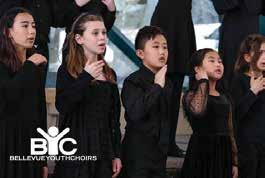






Coffee, Liège waffles and a vibrant community are at the heart of this inviting hub
By Alayne SulkinWelcome to Arosa Café (@arosacafe), where the vibrant essence of Venezuela meets Seattle’s rich coffee culture. Nestled among an eclectic array of independent shops located adjacent to the Washington Park Arboretum, Arosa is a beacon of warmth and camaraderie. At its helm is charismatic owner Cesar Santangelo, whose passion for community, coffee — and the café’s signature waffles — radiates from the moment you cross the threshold. In a city teeming with more than 300 coffee shops, Arosa is a unique cultural hub, one where the aroma of freshly ground coffee beans intertwines with the joyous chatter of friends, families and strangersturned-regulars (like me). Step inside and you’ll be enveloped in its tapestry of flavors, colors and heartfelt connections.
ParentMap sat down with Santangelo to talk about culture, community and — of course — coffee.

How has your Venezuelan cultural background influenced the atmosphere and menu at Arosa Café?
Santangelo: In Venezuela, we embrace warmth and exude a genuine sense of generosity. We possess an innate curiosity about people’s happiness and well-being. As an immigrant, I’ve built a community around our café that mirrors the closeness of a family. At Arosa, we have carefully crafted an intimate atmosphere where you will instantly feel at home, indulging in your favorite treats. Our goal is to provide a haven where you can recharge, be pampered, and relish in a joyful and comfortable environment.
You are a devoted husband to Adriana, and father to Alessandro, age 11, and Luciana, age 5. How do you incorporate family-friendly elements into the atmosphere at Arosa Café?
Creating a family-friendly experience comes naturally to us, as we are not only a business but a tight-knit family ourselves. We serve dishes that resonate with our own children’s preferences, incorporating fresh and simple ingredients that are ideal for school lunches. Our lunch combos are cleverly designed to accommodate both family outings and professional meetings. We maintain flexibility in our menu to cater to the discerning palates of both
little ones and those who are not so little.
Finding equilibrium between work and personal life can be a challenge, but as a team, we prioritize coordination and planning. To ensure quality family time, we have expanded our operational hours, allowing us to strike a harmonious balance.
What inspired you to open a coffee shop in Arboretum Court? Were there any specific reasons you chose this location?
It was our destiny! There was a magical moment when we needed to find our calling, and my wife went on Craigslist and found Arosa. This location had a sense of organic and intimate community. On one hand, you have all the businesses around that have grown and succeeded throughout the years, thanks to the support of the loyal customers and also the surrounding areas, like the gorgeous arboretum, The Bush School and the amazing neighborhood.
Cesar Santangelo.As a business owner, what have been your greatest challenges on your journey to establish and expand Arosa Café?
Building trust among our clientele has been one of the greatest challenges we encountered. Demonstrating our commitment to longevity and maintaining a service characterized by integrity and love was paramount. Over the course of nine years, we have proven ourselves as steadfast keepers of this establishment. You can feel it in the air. Many are bringing their loved ones and new babies. It’s quite awesome how we’ve seen singles become families.
Have you discovered any surprising or unexpected connections between your neighbors at Tricoter knitting shop, going on 40 years, and new neighbor The Power Petite, now celebrating its first anniversary?

All the time, it’s like going skiing without snow or gear. One can’t be without the other. People have said this is their ritual now. They come to Arosa Café for a mood recharge, then go next door for baby gear and clothes at The Power Petite, lunch at Nick’s, or to Nick’s wife Ryan’s boutique, Emry.
We are like brothers and sisters in this small community. We’ve been faced with a significant amount of crime recently, and we have each other’s backs. I know for a fact, from your daughter Ari, at The Power Petite, that the store exists in great part due to Refind co-owners Susie Cohen and Jeannine Christofilis, who literally put their arms around her to help establish her children’s high-end consignment shop. I can see that she’s created a community herself with young parents in our community.
Have you observed any heartwarming interactions between your children and customers at the coffee shop?
We have so many that you would truly cry! There is one that has stuck out the most. When we acquired Arosa Café, our son Allesandro was only 2. He’s now 11 and will be entering middle school this fall. Customers have seen him grow up, make deliveries and tend the till. When we were expecting our daughter Luciana, who is 5 now, everyone was excited and wanted to be part of it in some way. Arboretum Court tenants and regular customers threw a baby shower for us. Now, that’s something! This is “family” in capital letters.
Find it: Arosa Café is located at 3121 E. Madison St. in Seattle’s Madison Valley neighborhood. ■
Alayne Sulkin is the publisher and CEO of ParentMap. Her daughter Ari is owner of The Power Petite, which is featured in this neighborhood spotlight.

After a visit to the Washington Park Arboretum, swing by Arosa Café to greet Cesar, and then check out these other Arboretum Court businesses families should know about.
Belle Epicurean (belleepicurean.com): This local bakery has been a favorite of Seattle families for almost 20 years. Pop in after your arboretum visit to eat a flaky pastry, scrumptious sandwich or decadent dessert.

The Power Petite (thepowerpetite.com): Because kids outgrow their clothes at lightning-fast speeds, there’s The Power Petite. Stop in to find consigned luxury brands for kids, from birth through the teen years, plus maternity wear, adorable accessories and gear for all your parenting needs.

The Refind Closet (therefindcloset.com): Whether you’re looking for your next handbag or a pair of strappy sandals, you can find it at this upscale resale shop that helps buyers and consignors extend the life of their luxury goods.
Emry Boutique (shopemry.com): If your wardrobe needs a glow-up, put a stop at Emry on your list. This boutique has it all, including thoughtful gifts and musthave accessories.
Nick’s on Madison (nicksonmadison.com): There’s nothing quite like sitting down to a meal or enjoying a cool drink at Nick’s on Madison after touring the Seattle Japanese Garden or kayaking around the Montlake Cut.
Tricoter (tricoter.com): Knitters of all ages will love the colorful array of yarns lining the wall at Tricoter. Stop in to pick up a pattern, register for a class or find a knitting kit to keep you busy this summer.
Frenchy’s Day Spa (frenchysdayspa.com): Because nothing wears you out quite like parenting, put a trip to Frenchy’s on your to-do list. Manis, pedis, massages and more round out the services menu at this favorite neighborhood spot.
— Allison Sutcliffe Top l to r: Jeannine Christofilis and Susie Cohen, owners of The Refind Closet. Bottom: Ari Sulkin, owner of The Power Petite L to r: Linden Ward and Beryl Hiatt, Tricoter ownersWhen The Atlantic published an article by social psychologist
Jonathan Haidt titled “Get Phones Out of Schools Now” this past June, I wasn’t surprised by his plea. The numerous studies cited in the piece mirror my experience as an educator: students earning lower grades, underperforming on tests and struggling to retain information when their phones are out.

The U.S. Surgeon General’s 2023 Advisory notes that “adolescents who spent more than three hours per day on social media faced double the risk of experiencing poor mental health outcomes, including symptoms of depression and anxiety.” The advisory warns about impaired social connections and feelings of loneliness at school, further stating that social media cannot be concluded to be sufficiently safe for children and adolescents. The case is clear: Cell phones don’t belong in schools.
For a decade, the high school where I teach had a strict nophone policy. Cell phones were banned in classrooms, hallways and at lunch. After the pandemic, we relaxed the rules and allowed phones for “school-related tasks.”
At first it seemed like a good idea. Students took pictures of textbook pages to avoid lugging heavy books home. Many students could research, calculate and take notes faster on their phones than on paper or a laptop. Allowing kids to listen to music while working seemed innocuous enough at first. But soon those listeners spent half of class scrolling YouTube videos in search of the perfect song. The situation quickly devolved into masses of students who watched TikTok and checked messages during every lesson, every day. Relaxing cell phone rules had been an ill-informed disaster.
The Atlantic article states that the only way to truly create a phone-free school is to have students begin the day by placing their phones into a locker or lockable pouch that would remain contained until the end of the day. However, in this year of budget cuts, many districts don’t have the money to purchase fancy cellphone-locking pouches. Plus, it’s not a foolproof system. Students could simply claim they left their phone at home and bypass the policy. As a parent, I don’t love the idea either. The ability to con-
tact your child during an emergency is one of the primary reasons people buy their kids a phone in the first place.
This leaves enforcement up to classroom teachers. Educators have two options: Kids can either drop off phones in a designated spot when class begins, or teachers can make a rule that phones must stay silent and unseen.
The logistics of having kids drop their phones in a designated spot is tricky. An instructional delay is inevitable as students find, turn off and deposit their phones during the first few minutes of class. The policy also increases the likelihood of conflict before the bell even rings, which is not the best way to begin class. Not to mention, policing cell phone retrieval after class ends to ensure nothing is stolen is an extra chore. Plus, students can always claim they don’t have a phone and skirt the rule.
However, there are benefits of using a drop-off center. Putting phones out of reach at the beginning of class means teachers don’t have to spend time monitoring for stealth phone usage. Students won’t be tempted to sneak a peek at phones during class time, as they’re out of reach. It also has the potential to eliminate the “bathroom problem,” where students request to use the bathroom so they can have phone time.
Under this policy, teachers simply confiscate a cell phone if it’s heard or seen. It’s a simple strategy, but not without its own set of enforcement issues. While some kids will apologize and hand over the phone if they get caught, others will refuse to do so. In
those instances, can teachers simply take a phone off a student’s desk? Snatch a phone out of a student’s hands? TikTok is full of videos featuring students screaming at (and in one instance, pepper spraying) teachers for doing this. If a student drops their phone into a backpack or pocket as the teacher is en route to confiscate it, an administrator must be called to deal with the situation.
In a large public high school, enforcing this policy quickly becomes a full-time job. The school then needs a secure collection site and system to allow students to pick up their phone at the end of the school day — and a suitable deterrent to ensure compliance with the policy.

In the past, I’ve used a combination of these two policies. If I see a cell phone, the student has to put it in the pocket wall hanger for the period. If they refuse, an administrator is called and the student’s phone is confiscated for the day. These are policies I’ll be returning to in the fall. I’ll also be adding more context. While teaching my history students how to back up thesis statements with evidence, they’ll read evidence-based articles about cell phone use in schools as examples. While I’m under no delusion that students will agree with my no-cell-phone policy, giving teenagers the “why” is an important part of the learning process.
Enforcing a no-phone policy requires the entire school community to be on board. If most teachers let the issue slide, those who do enforce the school policy will be under more student pressure to allow phones in the class. If school administrators are unwilling or unable to confiscate phones or dole out punishment to frequent cell users, the no-phone policy will go belly up. Ditto if guardians and parents insist on the ability to reach their children throughout the day.
After two years of a relaxed cell phone policy, two years of lackluster student growth and two years of rapidly declining mental health in our teens, the cell phone debate is escalating from a classroom management issue to a moral imperative. If we want kids to soak up as much learning as possible and improve their mental health in the process, we must show them how to put their cell phones down — at least for the length of one class period. ■
Mom of two Jenna Vandenberg teaches history at a public high school north of Seattle.
Dental mouthguards are becoming more and more common — and recommended. The American Dental Association (ADA; ada.org) estimates that mouthguards help prevent more than 200,000 dental injuries each year. It is estimated that three million teeth are knocked out in kids’ sports each year!
Made from a polymer rubber material to help cushion a blow to the face, mouthguards minimize the risk of broken teeth and injuries to kids’ lips, tongue, face and jaw, especially when a child has braces. Once exclusive to boxers and football players, mouthguards, like helmets and seatbelts, are becoming standard safety gear.
“The expansion comes from increased awareness of facial injuries and their developmental consequences,” says Kim Trieu, DDS, a dentist in practice at North Everett Family Dental who also teaches at the University of Washington School of Dentistry. Some 30 percent of all sports injuries are related to the mouth and teeth,


so mouthguards are appropriate for any activity with the potential for facial trauma. The ADA recommends the use of mouthguards in 29 sports, for both games and practice sessions.
Ready-made “boil and bite” mouthguards are cheap and easy to use, but they can impede speech and are not very comfortable. For frequent wear and to improve compliance, kids can have more comfortable mouthguards made by their dentist. Since they are customized, these mouthguards can be made in favorite colors or even embedded with decals of favorite characters.
Bruxism, the repetitive grinding and clenching of teeth during deep sleep (sleep bruxism) or when a child is experiencing stress (waking bruxism), is another common issue in kids, occurring in 3 out of 10 children younger than age 5. Though not typically a cause for alarm — and most kids outgrow it — grinding of teeth can result in jaw discomfort, tooth sensitivity and damage to the teeth over time. If this is an issue for your child, talk to your dentist to determine if your child needs a night guard or splint to protect their teeth while they sleep. ■




At Redmond Kids’ Dentistry, we treat each family like our extended family. We help each child achieve optimal oral health in a caring and safe environment. From age 1 to 18, our team helps guide you and your child through their developmental stages, starting from your baby’s rst tooth.


Top Dentists
Dr. Stephanie Su and Dr. Purva Merchant say their biggest reward is in all the smiles they see. We look forward to meeting you!











